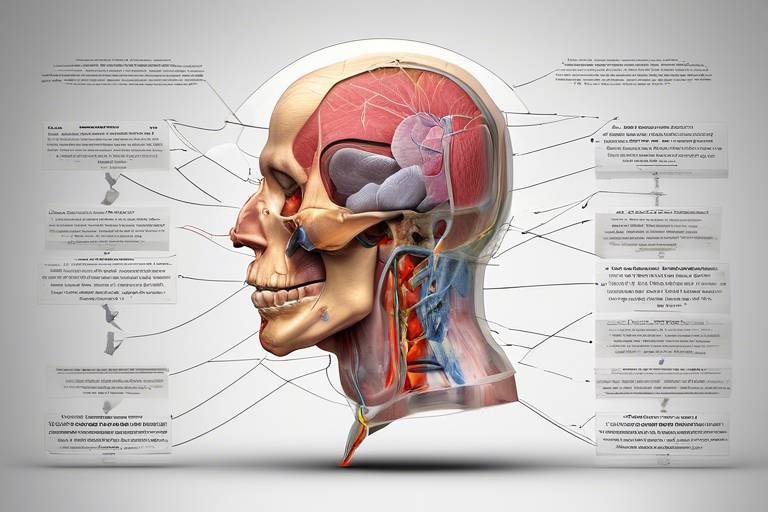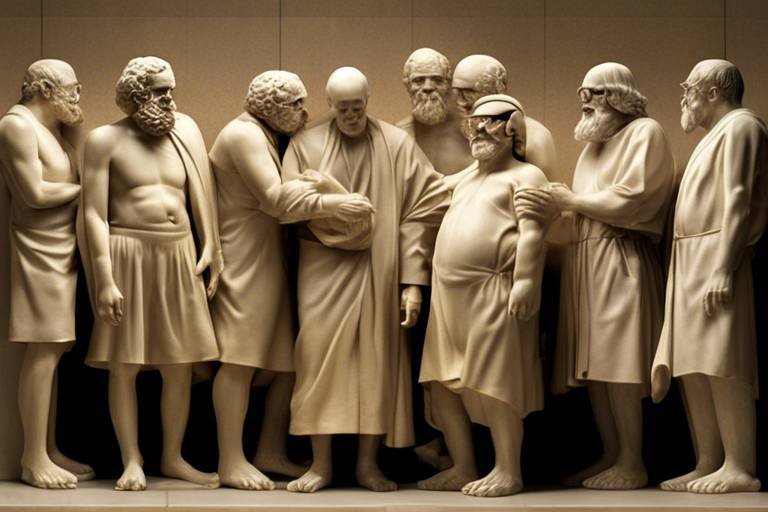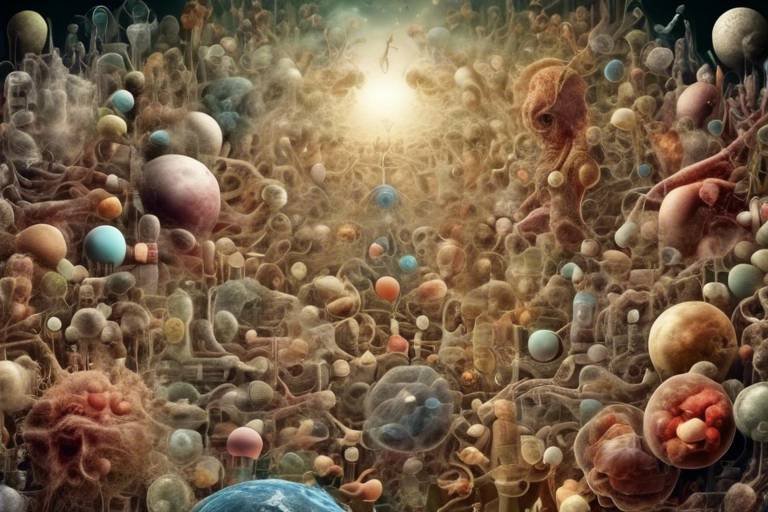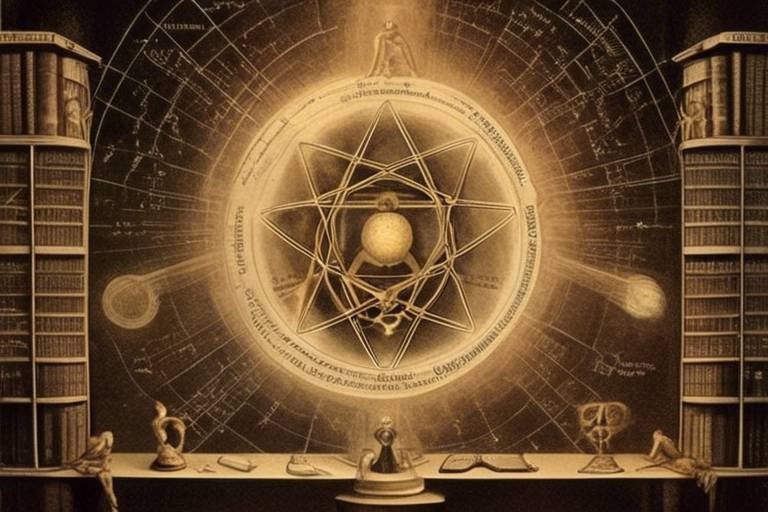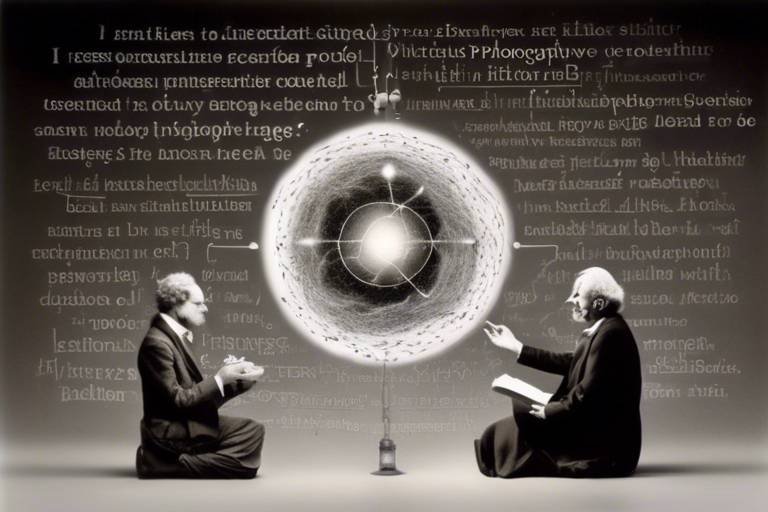The Anatomy of Determinism in Science
Determinism is a concept that has intrigued philosophers, scientists, and curious minds alike for centuries. At its core, determinism posits that every event or state of affairs, including every human action, is the outcome of preceding events in accordance with the natural laws. This idea suggests a universe governed by predictable patterns, where the future is merely an extension of the past. However, the implications of determinism are profound, raising questions about free will, morality, and the nature of reality itself. In this exploration, we will dive into the historical context of determinism, its evolution through scientific advancements, and its relevance in various fields today. By understanding determinism, we can better appreciate our place in the cosmos and the intricacies of the universe we inhabit.
To grasp the concept of determinism, we must first define its fundamental principles. Determinism asserts that the universe operates under a set of laws that dictate the outcomes of all phenomena. Imagine a massive, intricate clockwork mechanism—each gear and cog perfectly aligned to produce a specific outcome. This mechanical view contrasts sharply with notions of randomness and chaos, where events appear to occur without a discernible pattern. In a deterministic framework, if we had complete knowledge of the initial conditions of a system and the laws governing it, we could predict its future states with absolute certainty. This predictability is what makes determinism a cornerstone of scientific inquiry, providing a basis for formulating hypotheses and conducting experiments.
The journey of determinism through history is a fascinating tale filled with key thinkers and groundbreaking scientific advancements. From the early musings of philosophers like Aristotle to the revolutionary ideas of Isaac Newton, the understanding of determinism has evolved dramatically. Newton's laws of motion, for instance, established a framework for understanding physical phenomena in a predictable manner, laying the groundwork for classical mechanics.
Isaac Newton's contributions to determinism cannot be overstated. His formulation of the laws of motion and universal gravitation provided a comprehensive model for understanding the physical world. Newtonian determinism posits that, given the position and velocity of an object at one moment in time, one can calculate its future position and velocity with precision. This predictability was revolutionary, allowing scientists to develop mathematical models that could describe everything from the trajectory of a cannonball to the orbits of planets. Newton's work solidified the belief that the universe is orderly and governed by rational laws.
The impact of Newton's deterministic view on classical mechanics was monumental. It allowed for the development of a range of mathematical tools and techniques that scientists could use to model physical systems. For example, the principles of calculus, which Newton co-developed, became essential in predicting the behavior of moving objects. This deterministic approach was not just limited to physics; it influenced various fields, including engineering and astronomy, enabling advancements that shaped our modern world.
Despite its successes, Newtonian determinism faced significant critiques and limitations. As science progressed, new theories began to emerge that challenged the deterministic view. The advent of thermodynamics introduced concepts of entropy and disorder, suggesting that not all systems could be predicted with certainty. Furthermore, the rise of chaos theory revealed that even deterministic systems could exhibit unpredictable behavior under certain conditions. These developments raised important questions about the absolute nature of determinism and its applicability to complex systems.
The transition from classical to quantum mechanics marked a pivotal moment in the history of determinism. Quantum theory introduced a radical departure from traditional deterministic views, suggesting that at the subatomic level, particles do not have definite positions or velocities until they are measured. This inherent uncertainty challenges the very foundation of determinism, leading to the concept of indeterminacy. In a quantum world, probabilities replace certainties, and the idea that we can predict outcomes with absolute accuracy becomes increasingly tenuous.
Today, determinism continues to play a significant role in various scientific disciplines, from physics to biology. However, the implications of determinism extend beyond mere predictions; they influence our understanding of free will and causality. As we navigate through modern science, we find ourselves grappling with the balance between deterministic models and the complexity of living systems.
In the realm of physics, determinism is applied across various branches, including relativity and quantum mechanics. While classical mechanics adheres to deterministic principles, the ongoing debates regarding the validity of determinism in quantum mechanics highlight the complexities of modern physics. Some physicists argue that determinism still holds at a macro level, while others contend that the probabilistic nature of quantum mechanics fundamentally undermines the deterministic view.
Determinism's influence extends beyond physics into fields such as biology, psychology, and social sciences. In biology, for instance, deterministic models have been used to understand genetic inheritance and evolutionary processes. However, the complexity of living systems often resists simple deterministic explanations. Similarly, in psychology, the interplay of nature and nurture raises questions about the extent to which human behavior is predetermined. As we navigate these fields, it becomes clear that while determinism provides valuable insights, it must be balanced with an appreciation for the intricate and often unpredictable nature of life.
- What is determinism? Determinism is the philosophical belief that every event or action is the result of preceding events in accordance with natural laws.
- How does determinism differ from indeterminism? While determinism asserts that outcomes are predictable given initial conditions, indeterminism suggests that some events occur randomly or without clear cause.
- What are the implications of determinism for free will? Determinism raises questions about the nature of free will, suggesting that if our actions are pre-determined, our sense of choice may be an illusion.
- How has quantum mechanics impacted the concept of determinism? Quantum mechanics introduced uncertainty and probabilities at the subatomic level, challenging traditional deterministic views.

Understanding Determinism
Determinism is a fascinating and complex concept that serves as a cornerstone of scientific inquiry. At its core, determinism posits that every event or state of affairs, including every human action, is the outcome of preceding events in accordance with the natural laws. Imagine a vast, intricate clockwork mechanism where each cog, wheel, and spring interacts perfectly with one another, leading to predictable outcomes. This analogy encapsulates the essence of determinism; if we know the initial conditions and the laws governing the system, we can forecast future states with remarkable precision.
However, determinism is not without its challengers. It stands in stark contrast to the ideas of randomness and chaos, which suggest that not everything is predetermined. In a deterministic universe, the future is as fixed as a well-written script, while randomness introduces the element of surprise, much like an improvisational play where actors respond spontaneously to each other's cues. The tension between these competing views raises profound questions about the nature of reality: Are we merely actors in a predetermined play, or do we possess the freedom to improvise our lines?
To better understand determinism, it's essential to explore its implications. Here are some key points to consider:
- Predictability: In a deterministic framework, the universe operates like a well-oiled machine, where knowing the past allows us to predict the future.
- Causality: Determinism reinforces the idea that every effect has a cause, promoting a linear view of time and events.
- Philosophical Implications: The deterministic view raises questions about free will, suggesting that our choices may be influenced or even predetermined by prior states.
In scientific terms, determinism is significant because it provides a framework for developing theories and models that explain the behavior of physical systems. For instance, classical mechanics, as established by Isaac Newton, exemplifies determinism through its laws of motion, which allow for the calculation of an object's future position based on its current state and the forces acting upon it. Yet, as we delve deeper into the realms of modern science, we find that the deterministic view is not universally applicable. The advent of quantum mechanics, for example, has introduced a paradigm shift, challenging the notion that we can predict the behavior of particles with absolute certainty.
Ultimately, understanding determinism is not just about grasping a scientific principle; it is about contemplating our place in the universe. It invites us to ponder whether our lives are governed by the unyielding laws of nature or if we possess the capacity to shape our destinies through our choices. This ongoing discourse fuels both scientific exploration and philosophical inquiry, making determinism a pivotal concept in our quest to comprehend the universe and our existence within it.

Historical Perspectives
Throughout the ages, the concept of determinism has undergone a fascinating transformation, shaped by the minds of great thinkers and the advancements of science. In its early days, determinism was primarily rooted in the works of philosophers who sought to understand the nature of reality and causation. The idea that every event or state of affairs, including every human action, is the outcome of preceding events in accordance with the natural laws sparked intense debates. One of the most significant periods in the history of determinism occurred during the Enlightenment, where thinkers like René Descartes and Baruch Spinoza laid the groundwork for a more systematic approach to understanding the universe.
As we moved into the 17th century, Isaac Newton emerged as a pivotal figure in the development of deterministic thought. His laws of motion and universal gravitation provided a mathematical framework that not only described physical phenomena but also suggested that the universe operates like a grand clockwork mechanism. This view of the universe as a predictable entity was revolutionary, and it led to the establishment of classical mechanics as a dominant force in scientific inquiry. Newton's contributions can be summarized as follows:
| Contribution | Significance |
|---|---|
| Laws of Motion | Formulated the principles governing the motion of objects, establishing a basis for predicting physical behavior. |
| Universal Gravitation | Proposed that all masses attract each other, providing a framework for understanding celestial movements. |
However, as we delved deeper into the 19th century, critiques of Newtonian determinism began to surface. The emergence of thermodynamics and statistical mechanics introduced a new layer of complexity, highlighting the limitations of a strictly deterministic view. Scientists like Ludwig Boltzmann emphasized the role of probability and randomness in physical systems, suggesting that while deterministic laws govern macroscopic phenomena, the microscopic world operates with an element of chance. This critique opened the door to discussions about the nature of chaos and randomness, leading to a more nuanced understanding of determinism.
Fast forward to the 20th century, and the introduction of quantum mechanics marked a seismic shift in our understanding of determinism. The work of physicists such as Max Planck and Albert Einstein challenged the classical view, introducing concepts like wave-particle duality and the uncertainty principle. Quantum mechanics posits that at the subatomic level, events are not strictly determined but rather probabilistic in nature. This revelation not only reshaped the landscape of physics but also ignited philosophical debates about the implications of indeterminism on free will and human agency.
In summary, the historical perspectives on determinism reveal a rich tapestry of ideas and debates that have evolved over centuries. From the clockwork universe of Newton to the probabilistic nature of quantum mechanics, our understanding of determinism continues to be challenged and refined. As we explore the implications of these ideas in modern science, we are reminded that the quest for knowledge is an ever-evolving journey, one that beckons us to question the very fabric of our existence.
- What is determinism? Determinism is the philosophical belief that every event or action is determined by preceding events in accordance with natural laws.
- How did Newton contribute to determinism? Isaac Newton formulated laws of motion and universal gravitation, establishing a framework for predicting physical phenomena.
- What challenges did Newtonian determinism face? The emergence of thermodynamics and quantum mechanics introduced concepts of randomness and indeterminacy, challenging the deterministic view.
- How does quantum mechanics affect our understanding of determinism? Quantum mechanics suggests that at the subatomic level, events are probabilistic rather than strictly determined, raising questions about free will.

Newtonian Determinism
Newtonian determinism, a concept that emerged from the brilliant mind of Isaac Newton in the 17th century, revolutionized our understanding of the physical universe. At its core, this principle posits that the future states of physical systems can be precisely predicted if their current conditions are known. Imagine a perfectly functioning clock: if you know the time now, you can calculate the exact time it will show in a week, a month, or even a year. This analogy captures the essence of Newtonian determinism, where every action has a predictable reaction, and the universe operates like an intricate, well-oiled machine.
Newton's laws of motion laid down the groundwork for this deterministic view. His first law, often referred to as the law of inertia, states that an object at rest will remain at rest, and an object in motion will continue in motion unless acted upon by an external force. This principle allows us to predict the behavior of objects with remarkable accuracy. For instance, when you throw a ball, you can calculate its trajectory, speed, and where it will land, assuming you consider all the forces acting on it, such as gravity and air resistance.
However, the implications of Newtonian determinism extend beyond mere calculations. It provided a framework for classical mechanics, enabling scientists to develop mathematical models that describe the motion of celestial bodies and terrestrial objects alike. The elegance of these models lies in their ability to simplify complex systems into understandable equations. For example, the famous equation F ma (force equals mass times acceleration) succinctly captures the relationship between an object's mass, the forces acting on it, and its resulting motion.
Yet, while Newtonian determinism was groundbreaking, it was not without its critiques. As the scientific community evolved, so too did the understanding of the universe. Critics began to point out the limitations of a purely deterministic view, particularly when it came to complex systems. For example, weather patterns, which are influenced by countless variables, can be notoriously difficult to predict accurately beyond a short time frame. This unpredictability introduces a level of chaos that challenges the notion of strict determinism.
Moreover, the advent of quantum mechanics in the early 20th century further complicated the landscape of determinism. Quantum theory introduced concepts such as indeterminacy and the uncertainty principle, which suggest that at a subatomic level, particles do not adhere to the predictable paths laid out by Newtonian physics. This shift from a deterministic to a probabilistic understanding of nature forced scientists to reconsider the very foundations of how we perceive reality.
In summary, while Newtonian determinism established a robust framework for understanding physical phenomena and paved the way for countless advancements in science, it also opened the door to new questions and challenges. The balance between predictability and chaos continues to be a pivotal discussion in the scientific community, leading to exciting explorations in both classical and modern physics.
- What is Newtonian determinism? Newtonian determinism is the idea that if we know the current state of a physical system, we can predict its future states with accuracy.
- How did Newton's laws influence science? Newton's laws provided a mathematical framework for classical mechanics, enabling the prediction of motion and the behavior of physical systems.
- What are the limitations of Newtonian determinism? Its limitations include challenges in predicting complex systems, such as weather, and the emergence of quantum mechanics, which introduces uncertainty.

Impact on Classical Mechanics
The impact of Isaac Newton's deterministic framework on classical mechanics cannot be overstated. His laws of motion provided a robust foundation for understanding the physical world, allowing scientists and engineers to predict the behavior of objects with remarkable accuracy. Imagine a world where you could throw a ball and know exactly where it would land, or where celestial bodies would orbit based solely on mathematical equations. This is the power that Newtonian mechanics unleashed, giving rise to a sense of control over the natural world that was previously unimaginable.
Newton's contributions established a clear relationship between forces and motion, encapsulated in his three laws. These laws dictate that an object in motion stays in motion unless acted upon by an external force, that the force acting on an object is equal to the mass of that object multiplied by its acceleration, and that for every action, there is an equal and opposite reaction. This predictable nature of motion laid the groundwork for a plethora of applications, from engineering marvels to astronomical predictions.
In classical mechanics, the deterministic approach meant that if one had complete knowledge of a system's initial conditions, one could calculate its future states with precision. This led to the development of mathematical models that describe everything from the trajectory of a projectile to the orbits of planets. For instance, the following table illustrates how Newton's laws can be applied to various physical scenarios:
| Scenario | Newton's Law Applied | Outcome |
|---|---|---|
| Projectile Motion | First Law | Predictable path based on initial velocity and angle |
| Falling Objects | Second Law | Calculable acceleration due to gravity |
| Rocket Launch | Third Law | Thrust generated equals the weight of the expelled fuel |
However, while Newtonian mechanics provided a powerful tool for understanding the universe, it was not without its critiques and limitations. As the scientific community delved deeper into the complexities of the physical world, they began to encounter phenomena that could not be fully explained by deterministic laws. For instance, the behavior of particles at the quantum level posed significant challenges to the notion of predictability. As scientists explored these new frontiers, it became evident that while Newton's framework was immensely useful, it was not the complete story.
In summary, the impact of Newton's deterministic view on classical mechanics has been profound, shaping our understanding of physical phenomena and enabling countless technological advancements. Yet, as we venture into the realms of quantum mechanics and beyond, we are reminded that the universe is far more intricate than a simple set of equations can capture. The dance between determinism and the unpredictable nature of reality continues to be a fascinating area of exploration in modern science.
- What is determinism in science? Determinism is the philosophical concept that every event or state of affairs, including human actions, is determined by preceding events in accordance with the natural laws.
- How did Newton influence classical mechanics? Newton's laws of motion established a framework for understanding physical phenomena in a predictable manner, allowing for precise calculations of motion and forces.
- What are the limitations of Newtonian mechanics? Newtonian mechanics struggles to explain phenomena at the quantum level, where uncertainty and indeterminacy come into play.
- Is determinism still relevant in modern science? Yes, determinism remains relevant, especially in fields like physics and biology, but it is often balanced with the complexities and unpredictabilities observed in living systems.

Critiques and Limitations
While Newtonian determinism laid a strong foundation for classical mechanics, it has not gone unchallenged. Critics argue that the deterministic view is overly simplistic, failing to account for the complexities and unpredictabilities inherent in natural systems. One major critique is that determinism assumes a level of predictability that is often absent in real-world scenarios. For instance, consider the weather: while meteorologists use models to predict conditions, the chaotic nature of the atmosphere means that forecasts can be notoriously unreliable beyond a few days. This unpredictability raises questions about the validity of deterministic models in capturing the full spectrum of natural phenomena.
Furthermore, the advent of quantum mechanics introduced a paradigm shift that directly undermined classical determinism. In the quantum realm, particles do not behave in a strictly predictable manner. Instead, they exist in a state of probability until observed. This phenomenon challenges the very essence of determinism, suggesting that at a fundamental level, the universe may not be as predictable as once thought. The famous Heisenberg Uncertainty Principle encapsulates this idea, stating that certain pairs of physical properties, like position and momentum, cannot be simultaneously known to arbitrary precision. This inherent uncertainty introduces a layer of complexity that deterministic models struggle to accommodate.
Additionally, proponents of chaos theory point out that even deterministic systems can exhibit behavior that appears random. A classic example is the butterfly effect, where small changes in initial conditions can lead to vastly different outcomes. This concept illustrates that while a system may be deterministic, predicting its future state can be practically impossible due to sensitivity to initial conditions. Thus, the deterministic framework can sometimes be misleading, as it may suggest a level of control and predictability that does not exist in practice.
Another limitation of determinism is its philosophical implications regarding free will. If every action and event is predetermined by prior states, then the notion of free will becomes questionable. This dilemma has sparked extensive debate among philosophers and scientists alike, with many arguing that a purely deterministic worldview undermines human agency. In this context, the implications of determinism extend beyond the realm of science, influencing ethical considerations and our understanding of responsibility.
In summary, while determinism has been a cornerstone of scientific inquiry, it is essential to recognize its critiques and limitations. The interplay between determinism, chaos, and quantum mechanics reveals a complex tapestry of interactions that challenge our understanding of the universe. As science continues to evolve, so too must our interpretations of these foundational concepts, adapting to new discoveries and insights that reshape our view of reality.
- What is determinism?
Determinism is the philosophical concept that all events, including moral choices, are determined completely by previously existing causes. In science, it implies that if we know the initial conditions of a system, we can predict its future states.
- How does quantum mechanics challenge determinism?
Quantum mechanics introduces the idea of probability and uncertainty at a fundamental level, suggesting that not all events can be predicted with certainty, which contrasts with classical deterministic views.
- What is the butterfly effect?
The butterfly effect is a concept in chaos theory that illustrates how small changes in initial conditions can lead to vastly different outcomes, highlighting the limitations of predictability in deterministic systems.
- Does determinism negate free will?
This is a debated topic; while determinism suggests that every action is predetermined, many argue that human consciousness and decision-making allow for a form of free will.

Quantum Mechanics and Indeterminism
Quantum mechanics represents a revolutionary shift in our understanding of the universe, challenging the very foundations of determinism that classical physics once upheld. At the heart of quantum theory lies the concept of indeterminism, which posits that not all events in the universe are predetermined and that some outcomes can only be described in terms of probabilities. This idea can be quite mind-boggling, as it suggests that, at the quantum level, particles do not have definite positions or velocities until they are measured. Imagine a game of dice where you can only know the outcome after the dice have been rolled; this is akin to how quantum particles behave.
One of the most famous illustrations of this indeterminism is the double-slit experiment. When light or particles pass through two closely spaced slits, they create an interference pattern that suggests they behave like waves. However, if we attempt to measure which slit the particle goes through, this wave-like behavior collapses, and the particle behaves like a classical object. This paradox raises profound questions: Are we merely observers in a universe that behaves according to its own set of rules, or do our observations actively shape reality? The implications of this are vast, extending beyond physics into philosophy and even our understanding of free will.
Moreover, the concept of superposition in quantum mechanics further complicates the deterministic view. It suggests that particles can exist in multiple states at once until they are observed. This is like having a coin that is both heads and tails at the same time until you flip it and see the result. The moment of measurement forces the system into one of the possible states, which introduces a level of unpredictability that defies classical deterministic principles.
To illustrate the contrast between classical determinism and quantum indeterminism, consider the following table:
| Aspect | Classical Determinism | Quantum Indeterminism |
|---|---|---|
| Nature of Events | Predictable and determined by initial conditions | Probabilistic and uncertain until observed |
| Example | Projectile motion | Behavior of electrons in an atom |
| Measurement Effect | No effect on the system | Collapses the wave function into a definite state |
As scientists probe deeper into the quantum realm, they encounter phenomena that seem to defy logic and intuition. For instance, the idea of quantum entanglement suggests that particles can become linked in such a way that the state of one instantly influences the state of another, regardless of the distance separating them. This eerie connection has led to debates about the nature of reality itself and whether our classical understanding of cause and effect still holds true in the quantum world.
In conclusion, the advent of quantum mechanics has not only revolutionized physics but has also sparked a profound philosophical debate about the nature of reality, causality, and free will. As we continue to explore these quantum mysteries, we must grapple with the idea that our universe may be far more complex and less predictable than we ever imagined.
- What is quantum mechanics? Quantum mechanics is a fundamental theory in physics that describes the physical properties of nature at the scale of atoms and subatomic particles.
- How does quantum indeterminism differ from classical determinism? Classical determinism asserts that given initial conditions, future states can be predicted with certainty, while quantum indeterminism suggests that outcomes can only be described probabilistically.
- What is the double-slit experiment? It is a famous experiment that demonstrates the wave-particle duality of light and matter, showing that particles can display characteristics of both waves and particles depending on whether they are observed.
- What is quantum entanglement? Quantum entanglement is a phenomenon where two particles become interconnected in such a way that the state of one particle instantly affects the state of the other, regardless of the distance between them.

Determinism in Modern Science
In the ever-evolving landscape of modern science, the concept of determinism remains a pivotal topic of discussion. Its relevance stretches across various scientific disciplines, influencing how we understand the universe and our place within it. At its core, determinism suggests that every event or state of affairs, including human actions, is the outcome of preceding events in accordance with the laws of nature. This idea can seem both liberating and constraining, as it raises questions about free will and the nature of causality.
In physics, for instance, determinism plays a critical role in both classical and contemporary theories. Classical mechanics, rooted in the principles laid out by Isaac Newton, operates on deterministic laws that predict the future states of physical systems with remarkable accuracy. However, as we delve into the realm of quantum mechanics, we encounter a paradigm shift. Quantum theory introduces a level of indeterminacy that challenges the very foundations of deterministic thought. The behavior of subatomic particles, for example, cannot be predicted with certainty; rather, we can only calculate probabilities of where a particle might be found. This shift has profound implications, suggesting that the universe may not be as predictable as once thought.
Moreover, the implications of determinism extend beyond physics. In fields such as biology, researchers grapple with the balance between deterministic models and the intricate complexities of living systems. For example, while genetic predispositions may suggest a deterministic view of certain traits, environmental factors and random mutations introduce a level of unpredictability that complicates this narrative. This interplay raises essential questions about the extent to which our biology determines our behavior and choices.
In the realm of psychology, the deterministic perspective has sparked debates concerning human behavior and decision-making. Are our choices truly our own, or are they merely the result of a series of biological and environmental influences? This question is further complicated by the emergence of fields like neuroscience, which seeks to understand the brain's role in shaping our thoughts and actions. As we uncover more about the mechanisms of the brain, we must consider how much of our behavior is preordained by neural pathways versus the influence of conscious choice.
To summarize, while determinism continues to provide a framework for understanding various scientific phenomena, it also invites scrutiny and debate. The duality of deterministic and indeterministic principles reflects the complexity of the universe. As we advance our scientific inquiries, we must remain open to the possibility that not everything is predetermined. This ongoing dialogue not only enriches our understanding of science but also deepens our appreciation for the mysteries that lie beyond our current knowledge.
- What is determinism? Determinism is the philosophical belief that all events, including human actions, are determined by preceding causes according to the laws of nature.
- How does quantum mechanics challenge determinism? Quantum mechanics introduces indeterminacy, suggesting that certain events cannot be predicted with certainty, only with probabilities.
- Is free will compatible with determinism? This is a complex debate; some argue that if determinism is true, free will is an illusion, while others believe that free will can coexist with deterministic principles.
- How does determinism apply to biology? In biology, determinism interacts with genetics and environmental factors, leading to discussions about the extent to which our biology influences behavior.

Determinism in Physics
When we think about , it’s like opening a treasure chest of profound insights into how our universe operates. At its core, determinism suggests that every event or action is the result of preceding events, governed by the laws of nature. This principle plays a crucial role in various branches of physics, where scientists strive to understand and predict the behavior of matter and energy. For instance, classical mechanics, rooted in the work of Isaac Newton, operates under deterministic principles, where the future state of a system can be precisely calculated if all initial conditions are known. Imagine throwing a ball: if you know its speed, angle, and the forces acting on it, you can predict exactly where it will land. Isn’t that fascinating?
However, the story doesn’t end there. As we dive deeper into the realm of physics, we encounter the complexities of quantum mechanics, which introduces an entirely different narrative. In this quantum world, particles behave in ways that defy our classical intuition. Instead of a predictable path, particles exist in a state of probability until measured. This notion of uncertainty challenges the deterministic view and raises questions about the very fabric of reality. It’s as if the universe is playing a game of chance, where the outcomes are not strictly determined but rather influenced by a myriad of factors. This shift has sparked intense debates among physicists regarding the validity of determinism in modern science.
To illustrate the contrast between classical determinism and quantum indeterminacy, let’s consider a simple table summarizing key differences:
| Aspect | Classical Physics | Quantum Physics |
|---|---|---|
| Nature of Events | Deterministic | Probabilistic |
| Predictability | Future states can be predicted | Outcomes are uncertain until measured |
| Example | Projectile motion | Electron behavior |
In addition to quantum mechanics, the principle of determinism also extends into the realm of relativity. Einstein’s theory of relativity, while fundamentally deterministic in its equations, introduces complexities that challenge our understanding of time and space. For example, the idea that time can dilate and contract depending on the observer’s frame of reference adds layers of unpredictability to our perception of events. This means that while the laws governing the universe are deterministic, our interpretation and experience of those laws can be quite different.
As we navigate through these intricate landscapes of physics, it becomes evident that determinism is not just a simple concept. It serves as a foundational pillar that supports our understanding of the universe, yet it also invites us to question the limits of our knowledge. Can we truly predict the future? Or do we merely operate under the illusion of control? These questions are what make the study of physics so captivating and endlessly intriguing.
In conclusion, determinism in physics is a rich tapestry woven from the threads of classical mechanics, quantum theory, and relativity. Each branch offers unique perspectives on how we understand causality and predictability in the universe. While classical physics provides a clear framework for prediction, the complexities introduced by quantum mechanics and relativity remind us that there is still so much to explore and understand. The dance between determinism and indeterminism continues to inspire physicists and philosophers alike, pushing the boundaries of what we know about our universe.
- What is determinism in physics? Determinism in physics is the idea that all events in the universe are determined by preceding events, governed by natural laws.
- How does quantum mechanics challenge determinism? Quantum mechanics introduces uncertainty, suggesting that outcomes are probabilistic rather than strictly determined.
- Is classical physics completely deterministic? Yes, classical physics operates under deterministic principles, allowing for precise predictions of physical phenomena.
- What role does relativity play in determinism? Relativity maintains deterministic equations but introduces complexities regarding the nature of time and space.

Implications for Other Sciences
When we talk about determinism, it’s easy to think of it as a rigid concept that applies only to physics or mathematics. However, its implications stretch far beyond those realms, weaving through various scientific disciplines like biology, psychology, and the social sciences. The interplay between deterministic models and the inherent complexity of living systems raises fascinating questions about the nature of life itself. How do these fields reconcile the predictability of determinism with the unpredictability of biological and social phenomena? Let's dive deeper into this intricate relationship.
In biology, for instance, the deterministic view can be seen in the study of genetics. The principles of Mendelian inheritance provide a framework that allows scientists to predict the traits of offspring based on parental genotypes. Yet, the reality is more nuanced; environmental factors and epigenetic changes can significantly influence gene expression, leading to outcomes that challenge strict determinism. This interaction between genetic predisposition and environmental influences reveals that while we may understand the rules, the game itself is often unpredictable.
Similarly, in psychology, determinism plays a significant role in understanding human behavior. Theories such as behaviorism suggest that all behaviors are determined by past experiences and environmental stimuli. However, human beings are not mere automatons; we possess the capacity for free will, creativity, and spontaneity. This raises an important question: to what extent are our actions predetermined, and how much is influenced by conscious choice? The ongoing debate between nature and nurture exemplifies this tension between deterministic models and the complexity of human experience.
In the social sciences, the implications of determinism become even more pronounced. Sociological theories often attempt to explain societal behaviors and trends through deterministic frameworks. For instance, economic models may predict market behaviors based on certain variables. Yet, real-world outcomes can be influenced by unpredictable factors such as political changes, cultural shifts, and technological advancements. This unpredictability suggests that while we can create models to understand social dynamics, the human element introduces a level of uncertainty that challenges pure determinism.
To illustrate the balance between determinism and complexity in these fields, consider the following table:
| Field | Deterministic Elements | Complexity Factors |
|---|---|---|
| Biology | Genetic inheritance patterns | Environmental influences, epigenetics |
| Psychology | Behavioral conditioning | Free will, creativity, individual experiences |
| Social Sciences | Predictive models of social behavior | Political changes, cultural shifts, human agency |
In summary, the implications of determinism in other sciences showcase a delicate dance between predictability and chaos. While deterministic models provide valuable insights, they must be tempered with an understanding of the complexity and unpredictability inherent in biological and social systems. This ongoing dialogue between determinism and complexity not only enriches our scientific inquiry but also deepens our understanding of what it means to be human in an ever-evolving universe.
- What is determinism? Determinism is the philosophical concept that every event or state of affairs, including human actions, is determined by preceding events in accordance with the natural laws.
- How does determinism affect our understanding of free will? The relationship between determinism and free will is complex; while determinism suggests that our actions are predetermined, many argue that humans still possess the ability to make choices.
- Can determinism be applied to all scientific fields? While determinism is a fundamental principle in many sciences, its applicability varies, especially in disciplines like biology and psychology where unpredictability plays a significant role.
Frequently Asked Questions
-
What is determinism in science?
Determinism is the philosophical concept that every event, including human actions, is determined by preceding events in accordance with the natural laws. In science, it implies that given the same conditions, the same outcomes will always occur. This idea contrasts sharply with randomness and chaos, which suggest that outcomes can be unpredictable.
-
How did Newton contribute to the idea of determinism?
Isaac Newton laid the groundwork for determinism through his laws of motion. He established that physical phenomena could be predicted if the initial conditions were known. This predictability in classical mechanics reinforced the idea that the universe operates in a systematic, orderly manner.
-
What are the critiques of Newtonian determinism?
While Newton's framework was revolutionary, it faced critiques, especially with the advent of quantum mechanics. Critics argue that Newtonian determinism fails to account for the inherent uncertainties observed at the quantum level, where outcomes cannot be precisely predicted, leading to the concept of indeterminism.
-
How does quantum mechanics challenge determinism?
Quantum mechanics introduces a level of unpredictability that starkly contrasts with classical deterministic views. In quantum theory, particles can exist in multiple states simultaneously, and their behavior is governed by probabilities rather than certainties, suggesting that not everything in the universe follows a deterministic path.
-
What is the relevance of determinism in modern science?
Determinism remains a significant topic in contemporary science, influencing various fields such as physics, biology, and psychology. It raises important questions about free will and causality, particularly in understanding how deterministic models can coexist with the complexity of living systems.
-
How does determinism apply to fields outside of physics?
In fields like biology and psychology, determinism can help explain certain behaviors and processes. However, these disciplines also recognize the complexity and variability inherent in living systems, leading to ongoing debates about the balance between deterministic models and the unpredictability of life.

